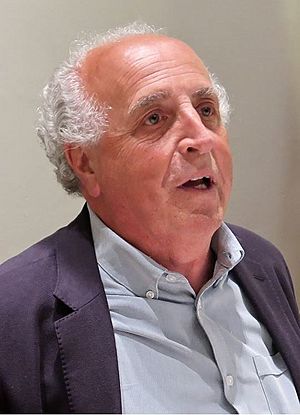Antonio Rodríguez de las Heras facts for kids
Quick facts for kids
Antonio Rodríguez de las Heras
|
|
|---|---|
 |
|
| Born |
Antonio Rodríguez de las Heras Pérez
19 September 1947 Vigo, Spain
|
| Died | 5 June 2020 (aged 72) Madrid, Spain
|
| Nationality | Spanish |
| Occupation | historian |
Antonio Rodríguez de las Heras Pérez (born September 19, 1947 – died June 5, 2020) was a Spanish historian. He was a professor at the Charles III University of Madrid. He also led the Faculty of Humanities, Communication and Documentation. Antonio was also the director of the Institute of Culture and Technology at the same university. He was known for his work connecting history with new technologies.
Contents
Early Life and Learning
Antonio Rodríguez de las Heras was born on September 19, 1947, in Vigo, Pontevedra, Spain. His family moved there because his father worked as a director at the Oceanographic Center of Vigo. His father was also a founder of the Official College of Chemists of Vigo.
Antonio first studied physics in Madrid. However, he later changed his mind. He moved to Salamanca and studied at the Faculty of Philosophy and Letters.
Career as a Historian
After finishing his studies, Antonio began his career by interviewing famous writers. He spoke with people like Salvador Espriu and Camilo José Cela for a newspaper called ABC. In 1971, he wrote a book about Ángel María de Lera.
He also worked for other newspapers, including Faro de Vigo. At the same time, he wrote a book called Os carneiros about people moving from Portugal to Europe. In 1974, he earned his doctorate degree from the University of Salamanca. His research on Filiberto Villalobos won special awards.
Teaching and New Ideas
In 1974, Antonio became a professor at the University of Extremadura. He chose this university because his wife was also a professor there. A year later, he started developing a new way to analyze political speeches. He called it the "discourse topology method." This method helped students understand history better.
Antonio taught at the University of Extremadura from 1974 to 1992. He started a special group called the Conflict Research Laboratory. In the late 1970s, he brought the first computers, Apple II, to the university. These computers helped study social sciences. He also taught at the University of Paris VIII for a short time.
In 1987, he became a full professor of Contemporary History. In 1991, he moved to the Carlos III University of Madrid. Later, the University of Extremadura honored him by making him a "doctor honoris causa" in 2017.
Connecting Humanities and Technology
Antonio was a pioneer in a field called "history of the present time." He believed that after World War II (1945), new technologies changed the world. Things like computers and communication tools made countries more connected. He developed the "Discourse Topology Method" to show how ideas are linked in speeches and texts. This method helped map out an author's thoughts.
He was very interested in how people and technology work together. He founded the Faculty of Humanities, Communication and Documentation. He also started the Institute of Culture and Technology (ICyT) at the Carlos III University of Madrid. Antonio believed that "the knowledge society" needs scientists, teachers, and artists to turn information into real understanding.
Antonio was also one of the first people in Spain to work with "digital humanities." This field uses computers to study human culture and history. He experimented with early forms of hypertext, which are like clickable links in digital documents. He created projects like By the shore of hypertext (1988) and Interactive History of Humanity (1997).
He also wrote articles for online magazines and a column in El País Retina.
Death
Antonio Rodríguez de las Heras passed away on June 5, 2020, at the age of 72. He died from COVID-19 during the COVID-19 pandemic in Spain.
Awards and Distinctions
- Extraordinary Doctorate Award and the University of Salamanca Board of Trustees Award (1974)
- Merit Medal from the Carlos III University of Madrid (2006)
- Doctor honoris causa from the University of Extremadura (2018)
- Fundesco Essay Award for his book Navigate information (1990)
See also
 In Spanish: Antonio Rodríguez de las Heras para niños
In Spanish: Antonio Rodríguez de las Heras para niños

